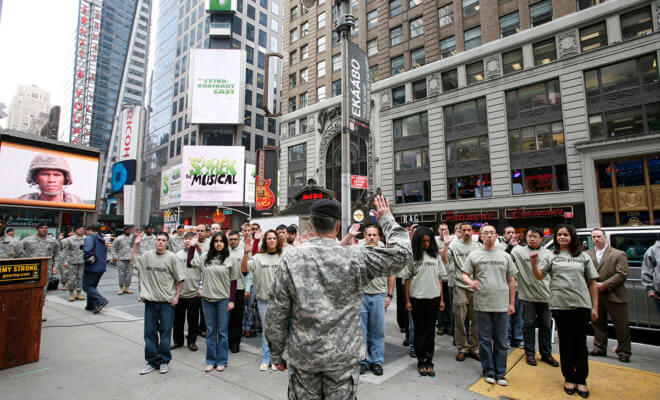Immigration
They Came Here to Serve. But for Many Immigrants, the Army Isn’t Interested.

A ceremony for recruits under the Military Accessions Vital to the National Interest program, at Times Square in New York, April 1, 2009.
Photo: Angel Franco/The New York Times
A growing number of foreign-born recruits who joined the U.S. military through a special program are being discharged before they can qualify for citizenship.
Recruit Zhang, an immigrant from China, joined the U.S. military on the promise that enlisting would lead to U.S. citizenship. He swore an oath to uphold the Constitution and was handed an Army T-shirt. But, after two years of delays, there came a sudden discharge that has left him reeling.
“They just said one word: I was ‘unsuitable,’” said the 30-year-old, who has a wife and child and a business management degree. He asked that only his last name be used. “I came here legally, made an agreement to stay legally, and they have not kept the agreement.”
A growing number of foreign-born recruits who joined the U.S. military through a special program created to recruit immigrants with valuable language and medical skills are being terminated before they can qualify for citizenship. Lawyers for the recruits say at least 30 have been discharged in recent weeks and thousands more are stuck in limbo — currently enlisted but unable to serve — and may also be forced out.
They are being cut even as the Army has been unable to meet its 2018 recruiting goals.
Zhang’s parents, a factory worker and a city official in southeast China, sold their house to support him while he waited two years to be called to boot camp. Now he may be deported and worries he could be punished by the Chinese government for enlisting in a foreign army.
“There’s no explanation for this except xenophobia,” said Margaret Stock, a retired Army Reserve lieutenant colonel and immigration lawyer who helped create the program. Known as the Military Accessions Vital to the National Interest or MAVNI, the program, created during the George W. Bush administration, allows legal, nonpermanent resident immigrants to join the military and get fast track citizenship.
More than 10,000 troops have joined the military through the program — almost all of them in the Army. At its start, the Army touted its foreign recruits, holding naturalization ceremonies with top brass in places like Times Square. But in recent years the Defense Department has tightened regulations, and thousands have been caught up in extra layers of security vetting. Increased scrutiny for the program began in the last months of the Obama administration over national security concerns.
To screen out possible terrorist or espionage threats, the military requires extensive background checks that have grown more complex in the past two years. The CIA and FBI do background checks, and screenings include criminal history and credit, a review of at least a decade of finances, an exhaustive questionnaire and numerous lengthy interviews. Relatives, employers and neighbors are also interviewed.
The layers of clearance have grown so complex that a backlog of several thousand cases has piled up. A Defense Department official testified in a recent deposition that it would take 50 years to clear those waiting to serve.
“We were told they didn’t have the resources to go through all the investigations,” said Robin Jung, a South Korean immigrant and college student who enlisted through the program. In 2014, his brother went through the program and was given citizenship in just a few months. Jung has been waiting two years.
A number of recruits have filed lawsuits claiming the delays and denials violate constitutional guarantees of equal protection.
The Defense Department responded to interview requests about the delays and increase in the number of discharges with a short statement, saying that any recruit “who receives an unfavorable security screening is deemed unsuitable for military service and is administratively discharged. Each recruit undergoes an individualized suitability review and the length of time for the review is dependent upon each individual’s unique background.”
So far, though, recruits in the 10-year-old program have not posed an undue security threat, according to a 2017 report by the RAND Corp. The report, which was never officially released, found that the program’s recruits were generally better educated and better performing than the average enlisted soldier. It also found that there had been no instances of terrorism or espionage connected to an immigrant recruit.
Before the Vietnam War, all legal immigrants could enlist regardless of permanent status, and throughout U.S. history a large slice of the troops who fought the nation’s battles have been immigrants, from Lt. Col. Alexander Hamilton to the more than 700 immigrants who have been awarded the Medal of Honor.
Still, very few recruits have made it through the vetting process in the past two years, Stock said. They are kept waiting, unable to work civilian jobs or go to basic training and start their military careers.
In the past two months, lawyers have seen a stark uptick in troops getting discharged after being notified they have failed background checks. Stock said it could be a result of an effort to clear the backlog.
Recruits say they are not told why they failed background checks and have no way to appeal.
One Pakistani immigrant, worried about the long wait, was able to get his security report in May through a Freedom of Information Act request. The report noted that the immigrant, an electrical engineering student recruited to repair generators, had dreamed of moving to the United States since he was 5, and had an American flag cover on his cellphone.
The recruit, the report stated, “has such a deep and long-standing loyalty to the U.S. that he can be expected to resolve any conflict of interest in favor of the U.S.”
“I jumped for joy. I was literally dancing when I read this because I knew there would be no problem,” said the recruit, who asked not to be named because he fears he could be harmed in Pakistan if he is deported.
In June he was told he had failed his security background check and was being discharged.
“I cried,” he said. “I feel like I have been kicked out of my own home.”
Pvt. 2nd Class Lucas Calixto, a Brazilian immigrant who moved to the United States with his parents when he was 12, was discharged this spring after enlisting in the Army Reserve two years ago.
Since enlisting, he had been going through drills regularly in Massachusetts, where his unit had supported him, he said.
In June he was abruptly discharged for “personnel security,” according to a form. He was given no other explanation.
Last week he sued the Defense Department in federal court, saying the discharge, with no warning and no explanation, violated department regulations and “the fundamental requirements of due process.”
“It was my dream to serve in the U.S. military. Since America has been so good to me, I wanted to give back and serve in the United States Army,” Calixto said in an email. “I know this is not coming from my military unit. They have been very nice to me. It seems as if the decision is being made by higher-ups who don’t know me and are just trying to complicate things.”
© 2018 New York Times News Service




You must be logged in to post a comment Login